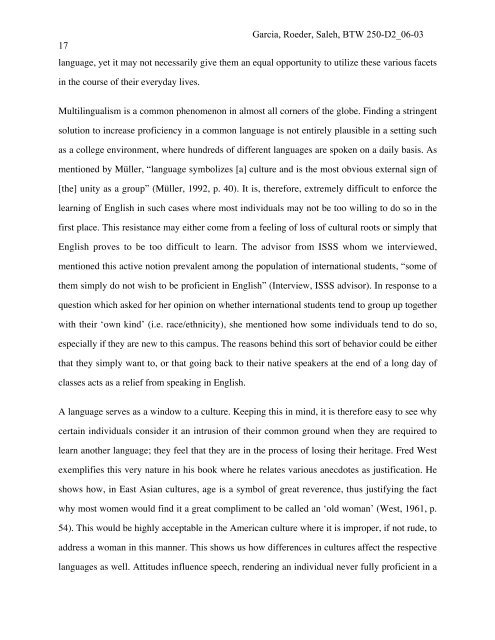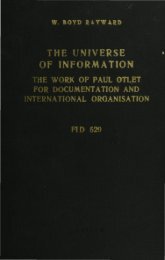Language Barriers in the University of Illinois Urbana ... - ideals
Language Barriers in the University of Illinois Urbana ... - ideals
Language Barriers in the University of Illinois Urbana ... - ideals
You also want an ePaper? Increase the reach of your titles
YUMPU automatically turns print PDFs into web optimized ePapers that Google loves.
Garcia, Roeder, Saleh, BTW 250-D2_06-03<br />
17<br />
language, yet it may not necessarily give <strong>the</strong>m an equal opportunity to utilize <strong>the</strong>se various facets<br />
<strong>in</strong> <strong>the</strong> course <strong>of</strong> <strong>the</strong>ir everyday lives.<br />
Multil<strong>in</strong>gualism is a common phenomenon <strong>in</strong> almost all corners <strong>of</strong> <strong>the</strong> globe. F<strong>in</strong>d<strong>in</strong>g a str<strong>in</strong>gent<br />
solution to <strong>in</strong>crease pr<strong>of</strong>iciency <strong>in</strong> a common language is not entirely plausible <strong>in</strong> a sett<strong>in</strong>g such<br />
as a college environment, where hundreds <strong>of</strong> different languages are spoken on a daily basis. As<br />
mentioned by Müller, “language symbolizes [a] culture and is <strong>the</strong> most obvious external sign <strong>of</strong><br />
[<strong>the</strong>] unity as a group” (Müller, 1992, p. 40). It is, <strong>the</strong>refore, extremely difficult to enforce <strong>the</strong><br />
learn<strong>in</strong>g <strong>of</strong> English <strong>in</strong> such cases where most <strong>in</strong>dividuals may not be too will<strong>in</strong>g to do so <strong>in</strong> <strong>the</strong><br />
first place. This resistance may ei<strong>the</strong>r come from a feel<strong>in</strong>g <strong>of</strong> loss <strong>of</strong> cultural roots or simply that<br />
English proves to be too difficult to learn. The advisor from ISSS whom we <strong>in</strong>terviewed,<br />
mentioned this active notion prevalent among <strong>the</strong> population <strong>of</strong> <strong>in</strong>ternational students, “some <strong>of</strong><br />
<strong>the</strong>m simply do not wish to be pr<strong>of</strong>icient <strong>in</strong> English” (Interview, ISSS advisor). In response to a<br />
question which asked for her op<strong>in</strong>ion on whe<strong>the</strong>r <strong>in</strong>ternational students tend to group up toge<strong>the</strong>r<br />
with <strong>the</strong>ir ‘own k<strong>in</strong>d’ (i.e. race/ethnicity), she mentioned how some <strong>in</strong>dividuals tend to do so,<br />
especially if <strong>the</strong>y are new to this campus. The reasons beh<strong>in</strong>d this sort <strong>of</strong> behavior could be ei<strong>the</strong>r<br />
that <strong>the</strong>y simply want to, or that go<strong>in</strong>g back to <strong>the</strong>ir native speakers at <strong>the</strong> end <strong>of</strong> a long day <strong>of</strong><br />
classes acts as a relief from speak<strong>in</strong>g <strong>in</strong> English.<br />
A language serves as a w<strong>in</strong>dow to a culture. Keep<strong>in</strong>g this <strong>in</strong> m<strong>in</strong>d, it is <strong>the</strong>refore easy to see why<br />
certa<strong>in</strong> <strong>in</strong>dividuals consider it an <strong>in</strong>trusion <strong>of</strong> <strong>the</strong>ir common ground when <strong>the</strong>y are required to<br />
learn ano<strong>the</strong>r language; <strong>the</strong>y feel that <strong>the</strong>y are <strong>in</strong> <strong>the</strong> process <strong>of</strong> los<strong>in</strong>g <strong>the</strong>ir heritage. Fred West<br />
exemplifies this very nature <strong>in</strong> his book where he relates various anecdotes as justification. He<br />
shows how, <strong>in</strong> East Asian cultures, age is a symbol <strong>of</strong> great reverence, thus justify<strong>in</strong>g <strong>the</strong> fact<br />
why most women would f<strong>in</strong>d it a great compliment to be called an ‘old woman’ (West, 1961, p.<br />
54). This would be highly acceptable <strong>in</strong> <strong>the</strong> American culture where it is improper, if not rude, to<br />
address a woman <strong>in</strong> this manner. This shows us how differences <strong>in</strong> cultures affect <strong>the</strong> respective<br />
languages as well. Attitudes <strong>in</strong>fluence speech, render<strong>in</strong>g an <strong>in</strong>dividual never fully pr<strong>of</strong>icient <strong>in</strong> a
















